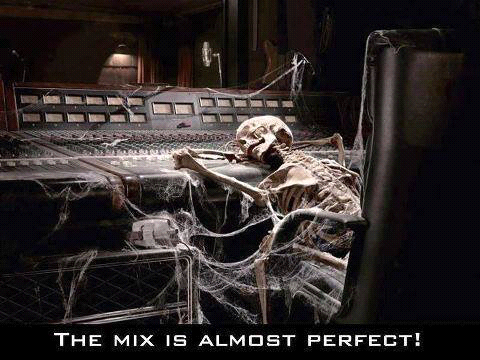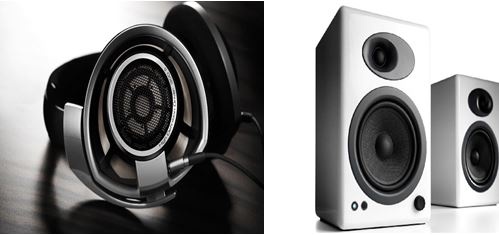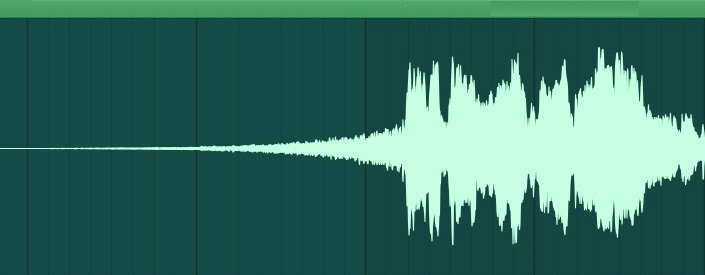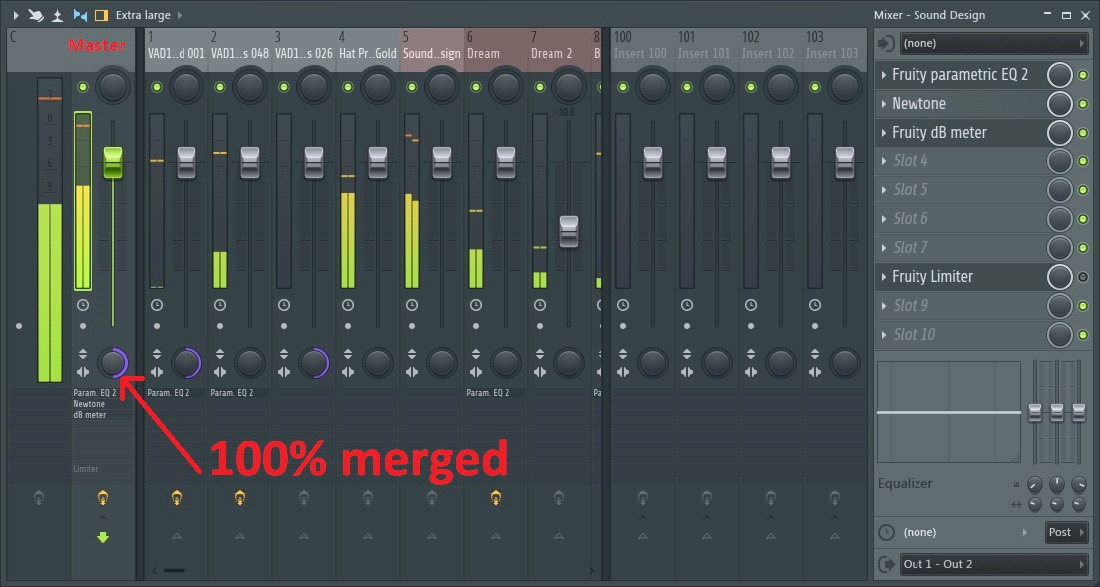7 mixing tips that will come in handy
Today I've decided to help you verify the quality of your mix. In this article I will give you 7 tips about mixing. But before that I would like to show you how to realise if a project of yours is finished. I will also present some of the most frequent mistakes made by a music producer. Why can't he finish a project?
When does he know when a project is done? Let's find out all these things together.
How do you know when a musical project is done?
It might seem like it is a simple question, but it's not. It's actually a very important one. The final result of all your work is the most important. It's everything. There is a point where you are simply done and you can't do anything else to the project.
When is a project done? Some might respond that it's done when it's perfect! In the following image you can see how you can achieve perfection:

In my opinion there is no such thing as 'perfect'. The perfect is an ideal. Don't try to make a perfect mix because you will never do that. Here are the most common mistakes. Because of them most music producers don't get to a final result.
1. They don't establish goals.
The more you know what you want, the better you will work in reaching that goal. Even from the first moments you should know how the final result should look like. When you are closer to it you won't realise that if you haven't established any goals. How could you finish something that you don't even know how it looks like? There are some producers that start from an idea and get to something completely different.
Don't take my idea for granted. For others, precision might work a lot better. It depends on your working style.
2. I keep making changes and I'm not able of finishing the mix.
This is a beginner's problem. This is the most chaotic style of work. At the beginning I was like that too. I was modifying a project over 10 times and I was hoping that it will sound good.
It's like playing the lottery 100 times and hoping to get the right numbers. When it comes to palpable results, there is no luck. You can modify a project one hundred times. If you don't know how it should look like then it won't make any sense.
In my opinion you need a clear and well defined result.
3. Trying to achieve perfection.
This will make you work a lot for nothing. Even further, it will stress you. Ok, let's say that you've gotten over this, but there are still things to verify. You've just finished a mix. You are pleased that it's done. You need a careful verification. You need to make sure that everything sounds good.
How can you do this? I've prepared for you a few free tips.
Here are my mixing tips
1. In a mix, each element needs to sound clear.
Listen to your mix and check all the elements. If there are elements that sound a bit unclear then there are still problems. Even if you have multiple elements in your project you should be able of distinguishing each one with ease. Your instruments should be easy to recognise in a mix.
2. Listen to your mix using as many audio sources as possible.
When I'm saying audio sources I'm referring to monitors, speakers, headsets, etc. Any equipment that can play music should be considered.

A project will sound different depending on the source. The funny thing is that on certain sources you won't even hear all the sounds. Listen the song on a professional sound system! You will definitely hear sounds that you can't hear on average systems. My suggestion is that you should listen on a professional system. Only then you will know for sure how does your mix sound. A professional sound system will show you all your mistakes. By listening on an average system, the mistakes won't be as 'visible'.
At a certain point, I've decided to change the bit rate of my mp3s. After telling this to a friend he responded "Do you have professional hardware to sense the difference?" If you were thinking that I didn't have such a system then you are right. I've decided to quit this idea soon afterwards.
The conclusion is simple. Between 88 KHz and 44 Khz you won't sense any difference as long as you don't have the necessary hardware. Let's solve another problem. What is the difference between headphones and speakers? How do you hear a mix when you are listening to your headphones, and how do you hear it on speakers?
By listening to your headphones the mix will sound different. Why? Because they are closer to your ears. This way you will hear each sound stronger. The way you will perceive the mix will be different. By listening to a pair of headphones you will hear everything clearer. There is also another noticeable effect when listening to headphones. All the effects like delay, reverb and others seem amplified. This is why sometime you tend to reduce these effects.
3. Verify if your mix has sudden volume drops.

Listen carefully and remove all the "crushes". Make sure that your result is as smooth as possible. Your mix must not have any sudden volume drops. In a mix no sudden effect sounds good. Any sudden stops or sudden starts will disturb the ear.

Even further, it will leave an unpleasant sensation. If you don't believe me then you can try this yourself. Any dry element that lacks reverb or continuity will sound empty. Listen to the intro of a good song. You can definitely hear how the volume increases steadily and smoothly until it reaches saturation. You should listen the ending of a song too. The track shouldn't stop suddenly. It should have a smooth volume decrease until it reaches zero.
There are other problems besides sudden or dry sounds. You need to check if your mix has other mistakes. These mistakes could be extra sounds, deafening frequencies, etc. Usually they can appear when you are using recorded sounds. There are tools that can help you remove "buzzes" or crashes. A good example is iZotope RX4. You can use iZotope RX4 to repair some problems like noise, distortions and inconsistent recordings.
Find out more from the review posted by ProTools Experts:
https://www.youtube.com/watch?v=XoNuykoJ6PQ
If the recording has a low quality, then I advise you to record it again.
4. Verify the mix on mono.
Center it if it's not so that there won't be any panning.

If it sounds well on mono then it will definitely sound well on stereo. A stereo mix usually deceives the ear. Any DAW has this function in the mixer. As an example, in FL Studio you can simply convert everything to mono. Just look at the knob in the image. Look at the master channel. There is no left-right panning.
It's extremely simple, but I guarantee that it works.
5. Recalibrate your ears.
After listening to your mix for a few times you might be deceived. After listening to it for a while, your ears and mind get used to that type of sounds. Fortunately there is a solution to this problem. Recalibrate your ears. Listen to a song that you like and compare the quality. You might end up listening to much to your own tracks. This is not advised. You can't learn from just your materials, no matter how creative you are.
You need to listen tracks made by other artists too! Only this way you will develop your own style.
6. Another good alternative is to ask for feedback.
If you are a beginner it is wise to ask for advice. But don't ask for everyone's advice. A good opinion comes from an expert. Many colleagues gave me feedback. Some of them were too general(they weren't actually saying anything), while others weren't actually helping at all, quite the opposite. The best thing you can do is to contact a sound engineer. Don't rely on people from forums. Verify their creations, and if they do really sound better than yours, then they might actually be able of giving you good advice.
They might find mistakes that you were unable to. An interesting fact about mixes is that they don't sound the same to every listener. If you consider it to be bad, others might find it to be awesome. It would be ideal to be very fastidious, but don't overdo it.
7. Take a break.
It might sound counter-productive, and it actually is. When everything runs smoothly, do you really need to take a break? After finishing your mix you should. There is a mistake that many music producers make. They mix their tracks at a very high volume. Under these condition, their ears wear out quickly. Your efficiency and level of focus decreases as well. In those moments you should stop rather than risk to ruin the mix.
I'm curious to see your reactions.
Bonus: a very important mixing tip.
I know how is it like to be a beginner. When you are in such a posture then you can't be very confident. This is why you need many methods of verifying if what you are doing is right. The most important things are experience and the level of knowledge. These will help you verify the quality of your mix. The good thing is that experience remains. Once you gain it you will always have an advantage.
As long as you have it, it will be easy to verify a mix and finish it.
I believe that I've covered most of this subject. If you believe that there is something to be added, then please leave a comment.
I hope you find this article useful.
Thank you for your attention!
















_Cropped.png?width=1600&name=02%20(2)_Cropped.png)




















Your Comments :